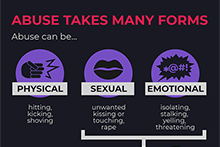
It can be hard for pre-teens and teens to know when a dating relationship is unhealthy. How can someone know what is “normal” in a relationship if they haven’t been in one before? When does “teenage drama” turn into abuse?
Abuse takes many forms.
Dating abuse can involve a current partner or past partner and can be in-person or digital. Abuse can be physical, sexual, or emotional.
- Physical abuse includes hitting, kicking, shoving, hurting someone with an object or weapon, or breaking their things on purpose
- Sexual abuse includes forcing, pressuring, or blackmailing someone into doing something sexual (kissing, touching, or having sex) when they don’t want to or are unconscious
- Emotional abuse includes bullying behaviors (name-calling, yelling, and humiliating), keeping them away from friends and family, threatening them, getting them fired from their job on purpose, or stalking
- Digital abuse is a type of emotional or sexual abuse. It includes constant texts and phone calls, using social media or GPS/spyware to track someone’s location, stealing passwords, or pressuring them to send explicit photos and videos
Dating abuse is common.
Dating abuse affects around one in ten high school students, and it is likely to be underreported. A CDC survey found that 10% of high school students had been physically hurt by a dating partner on purpose within the past year. This was higher among girls (12%) than boys (7%).
Sexual violence was even more common, with 11% of students reporting being forced to do something sexual within the past year by a dating partner. Again, more girls (16%) reported this than boys (5%).
According to loveisrespect.org, teens stay in abusive relationships for many reasons:
- Being scared of their abuser
- Not knowing whether a relationship is abusive or just “intense”
- Being afraid of being outed if LGBTQ+
- Feeling guilty or ashamed, like the abuse is their fault
- Thinking nobody will believe them
- Having feelings for their abuser and hoping things will change
- Believing it’s “just how it is” or that abuse is acceptable, especially if they saw a lot of abuse as a child
The effects are damaging.
These statistics are particularly troubling given the lasting impact dating abuse can have on victims. Students that had been abused by a partner were more likely than those that hadn’t to report being bullied on school grounds and missing school because they felt unsafe. Victims are also more likely to become depressed or anxious, use drugs or alcohol, become suicidal, or be abused in future relationships.
It can be prevented.
Teaching pre-teens and teens about healthy relationships is vital in preventing teen dating violence. By promoting positive relationship behaviors, teens learn about what they should expect from peers and how they are expected to behave toward peers, in both intimate and friendship relationships. Pre-teens and teens are forming ideas about relationships that can last a lifetime.
For more information, please see our resource guide on teen dating abuse.
Sources:
Dating Basics | loveisrespect.org
Types of Dating Abuse | loveisrespect.org
Youth Risk Behavior Surveillance — United States, 2015 | CDC (2016)
Kann L, McManus T, Harris WA, Shanklin SL, Flint KH, Hawkins J, Queen B, Lowry R, O’Malley Olsen E, Chyen D, Whittle L, Thornton J, Lim C, Yamakawa Y, Brener N, Zaza S
Why Do People Stay in Abusive Relationships? | loveisrespect.org
Associations of Teen Dating Violence Victimization with School Violence and Bullying Among US High School Students | Journal of School Health (2016)
Vivolo-Kantor AM, Olsen EO, Bacon S
Understanding Teen Dating Violence Fact Sheet | CDC (2016)
Additional resources:
Love Is Respect (866-331-9474)
National Domestic Violence Hotline – Teen Resources
National Resource Center for Teen Dating Violence Awareness Month
Start Strong: Building Healthy Teen Relationships
Understanding Teen Dating Violence Fact Sheet | CDC (2016)
[ARCHIVED CSN WEBINAR] Preventing Adolescent Dating Abuse: Research and Practice (2016)
Video resources:
The Escalation Workshop | One Love Foundation
The Halls | Start Strong Boston: Boston Public Health Commission